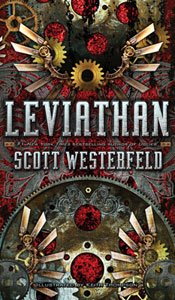Irene has covered Leviathan’s beautiful illustrations with author Scott Westerfeld, and Joe Monti sat down with artist Keith Thompson, but I’m here, as usual, to talk words.
When Leviathan opens, the world is split. England runs on the ingenuity of its scientists; the Darwinists manipulate animals’ and plants’ “life threads” to make powerful beasts of burden or lighter-than-air whale-zeppelins. Across the Channel, most of Europe has gone Clanker instead, using walking-machines and other gears-and-bolts technology and considering the Darwinists’ experiments with life unnatural and blasphemous to boot. It’s 1914, and the world is about to split a little wider.
One of our two young protagonists, Aleksander, is the only son of Archduke Franz Ferdinand—and if that makes you go “uh oh,” then you know how his story starts. The Austro-Hungarians are Clankers through and through, so Aleksander learns to pilot a walking war mecha while on the run.
Meanwhile, back in merry old England, Deryn Sharpe is a girl who wants to work on the great flying creatures, so she cuts her hair, dons her brother’s old uniform, and signs up for the midshipman’s test. I have a soft spot for girls dressing as boys to do things only boys are allowed to do. It’s an apt metaphor for growing up female even today, when models for success and independence are still largely masculine, if not overtly male. As a strong female character, Deryn is in good company with the no-nonsense Dr. Nora Barlow, preeminent Darwinist scientist and meddler in international relations. (Though I would, just once, like to see one of these crossdressing girls who doesn’t luckily end up with small breasts. It’s not only the A-cups who want to become knights or work on flying whales!)
Just as it’s important for girls to have books to read that show girls doing all the hard, smart, funny, dumb, and embarrassing things that we real-life counterparts do, it’s important to catch the boys as well, and the more we can do that all in one book, the better. I don’t know how true it is that girls are innately more verbal and social than boys, but does seem like parents and teachers can have a harder time getting boys to enjoy reading, which is obviously verbal and requires you to care about what other people are up to. (Worse, fictional people who won’t even throw a rock at you if you get bored and walk away from them!) Leviathan should play well to the boys who already like Transformers, Power Rangers, airplanes, or Animal Planet, with its Megazord-like machines and crazy creatures: the flying whale, the neurotic air-jellyfish, the bats that munch on razor blades.
There are a lot of cool things in Leviathan, but by favorite thing about the book was the way Westerfeld handled the movement between Deryn’s and Alek’s chapters. They could have met a little sooner, but the switch from one to the other was always just right—not too much of a cliffhanger, but enough so that I was excited to get back to either plotline. It gave the book great momentum, like swinging through the jungle on one vine after another. The strict discipline aboard the ship Leviathan and Deryn’s natural airmanship make a good contrast with Alek’s panicked flight—again, the difference is a source of energy in the book. I’ve read a lot of YA recently, like The Prophecy of the Sisters by Michelle Zink and The Tree-Shepherd’s Daughter by Gillian Summer, that feels like I’m pushing myself through the story rather than being pulled along by it, so I appreciate Westerfeld’s efforts on that front.
In the Uglies series, Westerfeld gave us “bubbly,” “brain-missing,” and a lot of other atmospheric but easily-decipherable slang terms. In Leviathan, he pays similar attention to the language; Deryn’s sections are littered with words like “boffin” for Darwinist scientists, the exclamation “barking spiders!”, and…well, who really needs to be told what a “clart-snaffling grin” is?
Perhaps your answer is, “a fourteen-year-old!”, the intended audience for Leviathan. I think it skews even a little younger; plotlines like four hundred pages worth of “avoid getting killed,” as well-constructed as the world may be, make me think middle grade. Then again, I was reading Clan of the Cave Bear when I was ten, so my perception might be off.
But trust me, your fourteen-year-old knows the modern-day equivalent of Deryn’s curse, and some parents might be glad to have a long book that doesn’t talk down to its audience, yet contains no sex. (Yeah…for the record, my mother didn’t vet Clan of the Cave Bear.) Leviathan is the kind of book I would have loved to find right after Brian Jaques but before Mercedes Lackey and Robert Jordan: smart, straightforward, detailed, and very light on its big metal feet.
Megan Messinger is a production assistant at Tor.com, and today she is reporting from a farm in Vermont. She has not been chased by a cow yet this visit and is a little disappointed.










